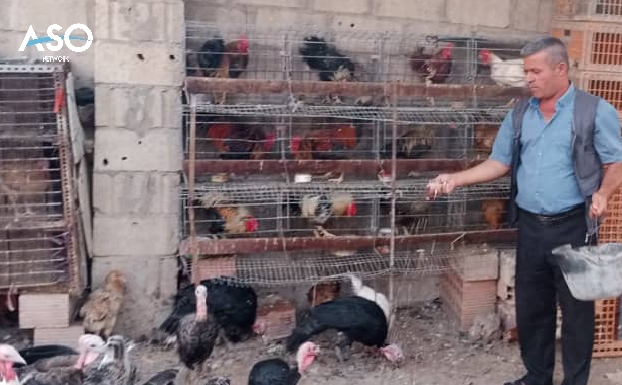News
Mobile bird sellers…continuous challenges facing their work

Avin Alo
The continuous rise in the exchange rate of the US dollar and the decline in the value of the Syrian pound caused many poultry and bird breeders to refrain from raising them for the purpose of trade. The closure of the crossings also affected the decline in the import of many types of birds, which made their owners quit working and resort to looking for other jobs to earn money. It is their daily sustenance, in light of the difficult living conditions experienced throughout the country, which has been exhausted by years of war.
Omar Hussein, a vendor traveling between Al-Hasakah and Al-Darbasiyah, used to spread out on the floor of the popular markets with his cages containing many types of roosters and chickens, for nearly 20 years in the summer and winter seasons.
Despite many people leaving this profession, Omar, the fifty-year-old salesman, continued his work, despite the difficult circumstances facing him. He would go out early on Sunday morning, before sipping tea, and place many cages for roosters, chickens, and rabbits in his cart, and travel long distances to reach his destination, in addition to… On Fridays, Omar goes to the market of the village of “Sikra” in Al-Hasakah Governorate, to earn his daily living.

The popular mobile markets, whose names are known by the days of the week, witness crowding as each seller places his goods in the appropriate place. Likewise, the seller Omar used to place his cages in his own place, in the “Sunday and Friday” markets, attracting the attention of passers-by who are interested in raising roosters and chickens from the local people. City and villages.
Between meeting customers’ desires and deferred selling
Omar used to sometimes give his customers some time to pay for the birds they bought from him, but he no longer does the same thing with them, due to changing economic conditions. He told Aso News Network: “Before 2019, business was good, because I moved from Raqqa and Al-Shaddadi. I used to buy and send about 40 cages for many types of poultry to the Kurdistan region, and in Hasakah I used to sell a hundred birds within a week, but now the situation has changed a lot, and the roads have been closed. In addition, the price of the dollar is unstable, and here we are forced not to deal with customers by selling on credit.”
Omar’s roosters are known for their excellence. People who want to put a beautiful bird in their home or have a good rooster to keep and feed find their request here.

Continuing despite the difficulties
Omar faces extreme difficulty in obtaining poultry, and people no longer come to him from everywhere to buy many types of birds and poultry as they used to. He says: “Previously, I could go to Al-Shaddadi and Raqqa to bring roosters and Hens, but now, due to the rise in fuel prices, I became content with buying them from the markets in the area, and bringing them to my 500-square-meter farm, located in Khashman neighborhood in al-Hasakah.”
Omar Hussein lifts a bucket of fodder and scatters it on the ground, and a smile appears on his lips as he feeds these birds with his hands and they crowd together so that each one of them gets the food they get twice a day.
Omar describes the method of obtaining fodder as an arduous and difficult task, due to its high prices. He tells the Aso Network: “People like me do not have a receipt card, so I buy wheat, corn, and dry bread from the market at an additional cost, which increases my burden, especially since a good meal must be provided to the birds in Autumn, because the beginning of winter makes their intestines dry. All of this leads to an increase in bird prices, and at the beginning of next year, the price of some types of these birds will reach 300 thousand Syrian pounds.”
Omar hopes that life will return to normal, so that work in this profession will continue. He said, “When the crossing between our regions and the Iraqi Kurdistan region opens, my work will return to what it was before, and the poultry selling movement may become active again, and there will certainly be more sellers.”
